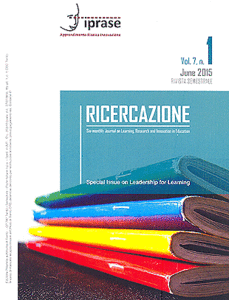Estratto – L’ipotesi di ricerca che avanziamo in questo articolo è che alcune qualità degli ambienti lavorativi all’interno delle scuole, tra cui il senso di autoefficacia degli insegnanti, il clima scolastico e la soddisfazione dei docenti, sono a fondamento della mobilitazione del capitale professionale di una scuola, contribuendo a determinare le condizioni motivazionali di base per l’efficace impegno dei docenti nel miglioramento dell’insegnamento e dell’apprendimento. L’articolo dimostra che le pratiche di leadership for learning, definite sulla base di un costrutto teorico contestualizzato alla dirigenza scolastica in Italia e misurate attraverso un questionario somministrato agli insegnanti di 47 scuole della Provincia Autonoma di Trento, non sono neutrali rispetto alla promozione di un ambiente lavorativo orientato all’apprendimento, anche dopo aver tenuto conto delle condizioni di contesto.
Abstract – The research hypothesis in this article is that some characteristics of workplace environments in schools, including teachers’ sense of self-efficacy, the school climate and teacher satisfaction, are the basis for mobilising the professional capital of a school, helping to determine the basic motivational conditions for effective use of teachers to improve teaching and learning. The article demonstrates that leadership for learning practices, established on the basis of a theoretical construct, adapted to the context of Italian school management and measured through a questionnaire completed by teachers in 47 schools in the Autonomous Province of Trento, are not neutral in relation to promoting a working environment oriented towards learning, even after taking into account the context and conditions.
Zusammenfassung – Dieser Artikel erforscht die Annahme, dass einige Merkmale des Arbeitsumfeldes in den Schulen, darunter das Selbstwirksamkeitsgefühl der Lehrkräfte, das Unterrichtsklima und die Zufriedenheit der Lehrkräfte, wesentlich für die Mobilisierung des beruflichen Kapitals einer Schule sind, da sie dazu beitragen, die grundlegenden Motivationsbedingungen für das Engagement der Lehrkräfte zur Verbesserung des Unterrichts und des Lernerfolgs zu bestimmen. Der Artikel zeigt, dass die Führungspraktiken für das Lernen, die auf der Grundlage eines theoretischen, auf die Schulleitung in Italien abgestimmten Konstrukts festgelegt und mittels eines Fragebogens gemessen wurden, der den Lehrkräften von 47 Schulen in der autonomen Provinz Trient vorgelegt wurde, Einfluss haben auf die Förderung eines Arbeitsumfeldes, das auf das Lernen ausgerichtet ist, auch nach Berücksichtigung der kontextuellen Bedingungen.









Commenti